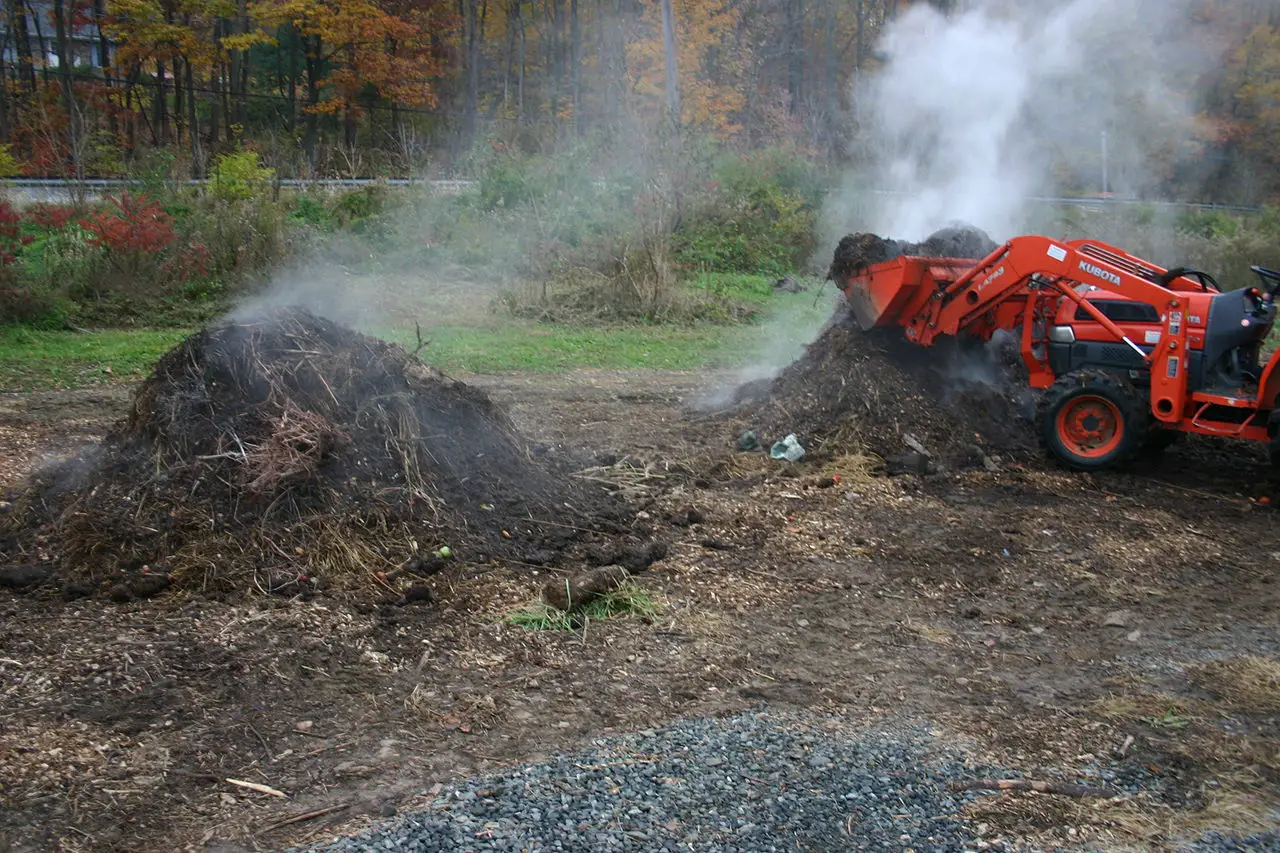Compost can rise to temperatures up to 160° Fahrenheit. However, it’s rare for compost fire to occur. The visible morning or evening smoke from a compost doesn’t mean your compost is smoldering. It’s normal. But in case of a fire, call the fire department.
Compost fire can happen when microbial activity, moisture, and air combine to generate too much internal heat. Spontaneous combustion occurs when the temperature rises above the ignition point of compost material. In other words, the compost will burst into flames.
However, for such internal conditions to occur, you’ll need to own a large compost pile, like those in commercial composting companies.
Small gardening composts can’t catch fire. But can reach high temperatures, which can significantly affect the quality of your compost.
How do you control your compost temperature?
Table of Contents
Can Compost Catch or Start a Fire?
If you’re doing commercial composting with large piles, then yes. It can catch fire. But, if it’s a small composting pile, the chances for a fire are pretty low, almost zero (but it can still happen).
It also depends on the kind of composting method.
There are two, and only one involves heat:
Cold composting, as the name suggests, involves no heat. It’s the kind of composting that occurs on forest grounds or in a worm bin (vermicomposting).
Hot composting involves heat. Under normal conditions, the compost can self-heat to temperatures between 135°-160° Fahrenheit. Therefore, this method is susceptible to fire.
The heat results from the energy released as the microorganisms break down the organic materials (This process is called fermentation).
Also, the air and the moisture content in the compost contribute to the rise in temperature.
Since most composting materials are insulators (does not allow heat to pass through), the heat can accumulate to points where it can ignite some of the dry brown materials (hay and grass clippings are more susceptible)
However, as I mentioned above, such conditions are rare for small composting, even with large piles that are turned regularly.
How Can Compost Catch Fire?
The following conditions must be met for a fire to start in a compost heap.
- Presence of biological activity. As the microbes decompose the compost, they cause chemical processes to generate heat.
- Available dry materials
- Dry air pockets
- Poor moisture distribution
- Large and unturned compost for a long time
Can Compost Heaps Spontaneously Combust?
It’s very rare with small composting piles. It’s impossible for a garden compost heap to suddenly burst into flames (unless you’re using petrol to moist the compost).
Spontaneous combustion occurs under extreme internal reactions, such as bacterial activity, which raises the compost temperature.
For such extreme conditions, the compost requires to be unturned for a long time to insulate the heat. Also, to have just the right airflow and moisture content to oxidize compost and turn it into flames.
Again, such conditions are impossible to meet in a small compost heap.
Therefore, you don’t have to worry about spontaneous combustion occurring in your compost bin.
Is A Compost Pile Too Hot?
It’s simple. When the thermometer reads over 160° Fahrenheit, then something is wrong.
Even though such temperatures are rare in compost heaps, poor compost maintenance can cause temperature rises.
The heat is good, but there are consequences if it’s too much. Compost heat helps to kill any harmful pathogens and pests that might find their way into the compost.
However, if it’s too hot, it might destroy the beneficial microbes.
If you don’t have a compost thermometer, It will be hard to tell whether the compost is too hot. You can’t simply look at a compost or thrust your hand into it to note the temperature levels.
What to Do to Prevent Compost Overheating
Do the following:
- Frequently turn your compost pile
- Avoid composting large piles of organic matter
- Maintain a good moisture distribution
- Avoid too much nitrogen in the compost bin, e.g., kitchen waste or green plants
1. Turning
Frequent turning of the compost pile helps release the insulated internal heat and evenly distribute the heat to all parts of the compost.
Turning also helps to moderate the compost temperature by improving airflow. Aeration has a cooling effect which helps to prevent overheating.
2. Avoid Large Compost Piles
As I mentioned earlier, the challenge with small compost piles is never overheating; instead, it’s low heat. So if you’re worried your compost is overheating, try dividing the compost into small piles.
However, note that if the compost pile is too small, the heat won’t rise, and the composting process will slow down.
3. Maintain Good Moisture Distribution
Water helps to cool the compost heap for the microorganisms to function properly. The pile should be moist, not too dry or too wet.
Add water when turning if the compost is dry. If it’s wet, add more carbon materials (dry leaves, grass clipping, sawdust, etc.)
4. Avoid too much nitrogen
Nitrogen speeds up microbial activity, which in turn increases temperature. To avoid overheating, ensure a good balance between nitrogen and carbon in a compost.
The nitrogen to carbon ratio should be 1 to 30, respectively.
How Do You Extinguish a Compost Fire?
The below procedure will work for small and large compost piles.
Step 1. Isolate the compost materials that have not yet caught fire. This helps to contain the fire and prevent it from growing.
Step 2. Spread out the burning compost and drench it with water.
Covering the compost with dirt to cut out oxygen supply only works for small compost heaps. The fire will continue to burn for large piles, even when covered with dirt.
It’s best to call the fire department and let them handle the fire, especially if you don’t have any experience with fire and the proper protective gear.

